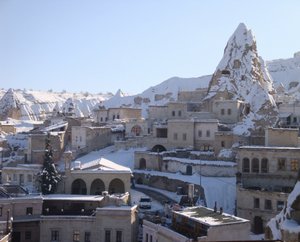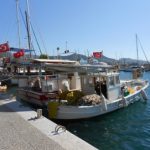Unlike other Mediterranean hotspots, Turkey has been slow to develop a winter tourism season. When the sun is blazing down on the coast in January this seems pretty bizarre but it only takes one harsh winter to act as a reminder of why travelling round the country between November and March isn’t always going to be plain sailing.
In 2011 snow blanketed most of the country from January onwards and made travelling overland tough even in the west. Snow like that is a routine feature of life during the eastern Turkish winter but winter in central and western Turkey is more of a fickle thing; one year you can be picnicking in the Ihlara Gorge in Cappadocia in January, the next year subzero temperatures, deep snow and lethal ice make it impossible to venture further than the nearest shop.
Even in a good year travelling at this time of year is made difficult by the fact that many coastal hotels and restaurants close from mid-October to mid-March. You won’t have trouble finding somewhere to stay in İstanbul, Ankara, İzmir or other big non-touristy cities with a business clientele. But many resorts still turn into ghost towns. Forget choice – you may have to stay in the one place that’s open.
Your best hope of finding mild weather lies with the Mediterranean – in a good year towns such as Antalya can be lovely even in winter. Others such as humid Adana may actually be more enjoyable to visit in winter.
In theory life kicks in again from mid-March onwards. In reality, however, this is when many hoteliers carry out running repairs. It’s also when local councils fix up holes in roads and pipes, a recipe for noise, mud and general chaos.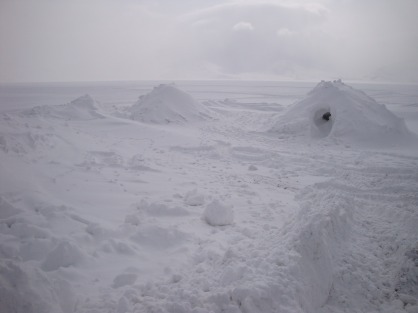 Tea-making igloos on frozen Lake Çıldır
Tea-making igloos on frozen Lake Çıldır
Say you’re lucky enough to find a hotel that’s open in winter. Before checking in, you’d be well advised to ask whether the heating is turned on. In big city hotels that shouldn’t be a problem but smaller family-run places may be reluctant to flick the ON switch because of the cost (a few will pass the charge onto you). If the hot water comes courtesy of solar power, beware – like pipes, these freeze up in winter. Sometimes the most old-fashioned hotels out east cope best with the cold – you’ll find piles of thick brown blankets in the bedrooms, old brown stoves belching out heat in the lobby and lashings of çay on the brew.
Driving round may protect you from the elements but leaves you at the mercy of the icy roads. In bad winters you will need chains (zincirler) on your tyres almost everywhere except along the coast, and the police may stop you in remoter areas to check that you’re properly equipped for emergencies. Mountain passes will be closed, buses delayed. Even some airports struggle to cope although that is a situation that is improving. Although the problems tend to be worst in remote Eastern Turkey, there can also be long delays around Mt Bolu and the Bolu Tunnel, midway between İstanbul and Ankara.
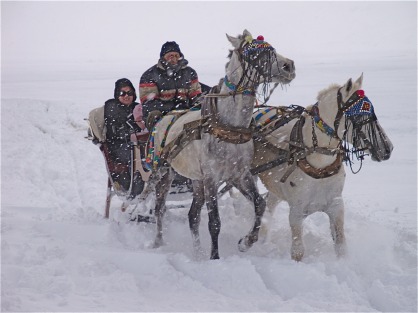 To get the most out of a trip to Turkey in winter you might want to embrace some of the specifically wintry attractions. These include a growing number of ski resorts but also much less familiar attractions such as the horse-drawn sleighs that operate on Çıldır Gölü near Kars when it freezes; the phaetons on skis that run around Abant Gölü; and the snow wrestling that takes place once a year at Veliköy, near Şavşat.
To get the most out of a trip to Turkey in winter you might want to embrace some of the specifically wintry attractions. These include a growing number of ski resorts but also much less familiar attractions such as the horse-drawn sleighs that operate on Çıldır Gölü near Kars when it freezes; the phaetons on skis that run around Abant Gölü; and the snow wrestling that takes place once a year at Veliköy, near Şavşat.
Winter is also a great time to eat roast goose (kaz), a traditional winter delicacy of the Kars area.
Read also:
http://turkeyfromtheinside.com/blogbloggingaboutturkey/entry/49-sumos-in-the-snow.html
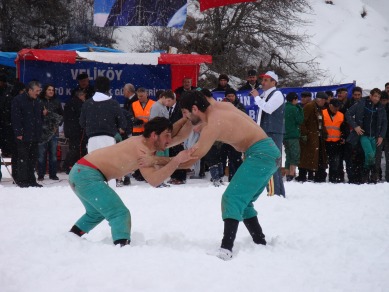 Snow wrestlers at Veliköy
Snow wrestlers at Veliköy
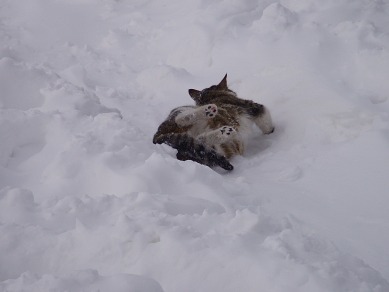 Fun for some!
Fun for some!
